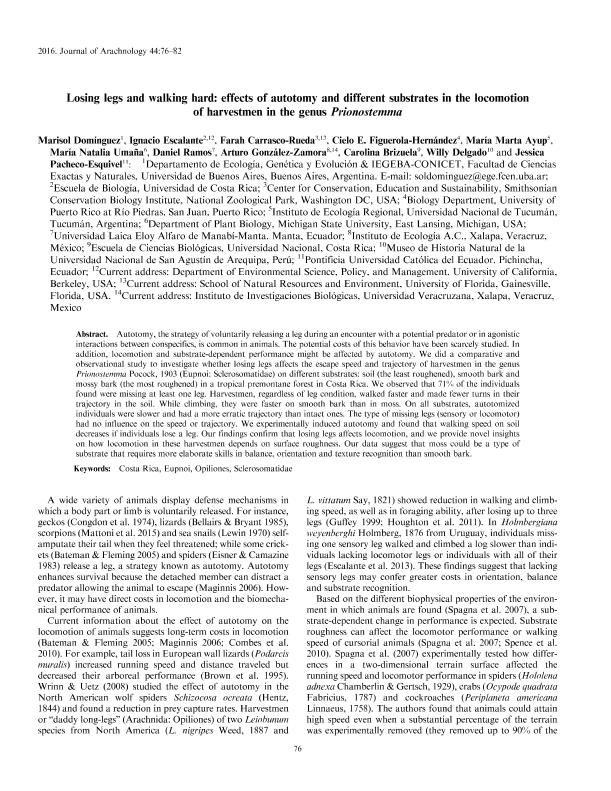Artículo
Losing legs and walking hard: Effects of autotomy and different substrates in the locomotion of harvestmen in the genus Prionostemma
Dominguez, Marisol ; Escalante, Ignacio; Carrasco-Rueda, Farah; Figuerola Hernández, Cielo E.; Ayup, María Marta
; Escalante, Ignacio; Carrasco-Rueda, Farah; Figuerola Hernández, Cielo E.; Ayup, María Marta ; Umaña, María Natalia; Ramos, Daniel; González Zamora, Arturo; Brizuela, Carolina; Delgado, Willy; Pacheco Esquivel, Jessica
; Umaña, María Natalia; Ramos, Daniel; González Zamora, Arturo; Brizuela, Carolina; Delgado, Willy; Pacheco Esquivel, Jessica
 ; Escalante, Ignacio; Carrasco-Rueda, Farah; Figuerola Hernández, Cielo E.; Ayup, María Marta
; Escalante, Ignacio; Carrasco-Rueda, Farah; Figuerola Hernández, Cielo E.; Ayup, María Marta ; Umaña, María Natalia; Ramos, Daniel; González Zamora, Arturo; Brizuela, Carolina; Delgado, Willy; Pacheco Esquivel, Jessica
; Umaña, María Natalia; Ramos, Daniel; González Zamora, Arturo; Brizuela, Carolina; Delgado, Willy; Pacheco Esquivel, Jessica
Fecha de publicación:
04/2016
Editorial:
American Arachnological Society
Revista:
Journal of Arachnology
ISSN:
0161-8202
Idioma:
Inglés
Tipo de recurso:
Artículo publicado
Clasificación temática:
Resumen
Autotomy, the strategy of voluntarily releasing a leg during an encounter with a potential predator or in agonisticinteractions between conspecifics, is common in animals. The potential costs of this behavior have been scarcely studied. Inaddition, locomotion and substrate-dependent performance might be affected by autotomy. We did a comparative andobservational study to investigate whether losing legs affects the escape speed and trajectory of harvestmen in the genusPrionostemma Pocock, 1903 (Eupnoi: Sclerosomatidae) on different substrates: soil (the least roughened), smooth bark andmossy bark (the most roughened) in a tropical premontane forest in Costa Rica. We observed that 71% of the individualsfound were missing at least one leg. Harvestmen, regardless of leg condition, walked faster and made fewer turns in theirtrajectory in the soil. While climbing, they were faster on smooth bark than in moss. On all substrates, autotomizedindividuals were slower and had a more erratic trajectory than intact ones. The type of missing legs (sensory or locomotor)had no influence on the speed or trajectory. We experimentally induced autotomy and found that walking speed on soildecreases if individuals lose a leg. Our findings confirm that losing legs affects locomotion, and we provide novel insightson how locomotion in these harvestmen depends on surface roughness. Our data suggest that moss could be a type ofsubstrate that requires more elaborate skills in balance, orientation and texture recognition than smooth bark.
Palabras clave:
Costa Rica
,
Eupnoi
,
Opiliones
,
Sclerosomatidae
Archivos asociados
Licencia
Identificadores
Colecciones
Articulos(CCT - CORDOBA)
Articulos de CTRO.CIENTIFICO TECNOL.CONICET - CORDOBA
Articulos de CTRO.CIENTIFICO TECNOL.CONICET - CORDOBA
Articulos(IEGEBA)
Articulos de INSTITUTO DE ECOLOGIA, GENETICA Y EVOLUCION DE BS. AS
Articulos de INSTITUTO DE ECOLOGIA, GENETICA Y EVOLUCION DE BS. AS
Citación
Dominguez, Marisol; Escalante, Ignacio; Carrasco-Rueda, Farah; Figuerola Hernández, Cielo E.; Ayup, María Marta; et al.; Losing legs and walking hard: Effects of autotomy and different substrates in the locomotion of harvestmen in the genus Prionostemma; American Arachnological Society; Journal of Arachnology; 44; 1; 4-2016; 76-82
Compartir
Altmétricas



